|
Core Evaluation Question III
What is the impact of the LSC professional development on teacher preparedness, attitudes, and beliefs about science and mathematics teaching and learning?
In this second year of core evaluation data collection, information about teachers' preparation, attitudes, and beliefs about science and mathematics education came primarily from teacher questionnaires, and to a lesser extent, from principal questionnaires. Cohort 1 projects augmented these data with teacher interviews.
For the newly-funded Cohort 2 projects, these spring 1996 data represent a baseline for gauging the impact of the LSC professional development in future years. Cohort 2 includes both projects that target elementary science (C2S) and projects that target elementary mathematics (C2M).1 Because questions asked about science and mathematics teaching were often different, these two groups are separated for analysis.2
Although this was the second round of data collection for Cohort 1 projects, it is too early to look for impacts of the LSC professional development within individual projects, since in a number of projects only a small proportion of teachers had participated at the time they completed the questionnaires.
This section describes the attitudes reported by teachers in each of the three groups-Cohort 1 science, Cohort 2 science, and Cohort 2 mathematics-without attempting to attribute any differences between Cohort 1 and Cohort 2 teachers to the LSC project. In a later section, we investigate the impact of professional development on both teacher attitudes and classroom practice by comparing untreated teachers in both cohorts to those that had received varying amounts of science/mathematics professional development during the previous year.
Teacher Attitudes and Beliefs about Science and Mathematics Education
A composite created from a number of questionnaire items provides insight into teachers' attitudes about teaching science and mathematics. This composite includes teacher ratings of the importance of various reform-oriented strategies for effective science/mathematics instruction, including:
- Providing students with concrete experience before abstract treatment;
- Developing conceptual understanding;
- Considering students' prior conceptions;
- Making connections with applications/ other disciplines;
- Using computers, hands-on, cooperative groups, and other investigative activities; and
- Using a variety of assessment strategies.3
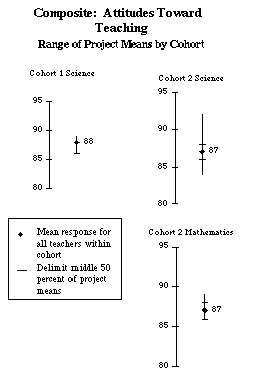 Figure 23 Mean responses to this composite show that most LSC teachers have remarkably positive attitudes toward science and mathematics reform. There is little variation among projects, with means ranging from a low of 84 percent to a high of 92 percent. (See Figure 23.)
In many areas, teachers report attitudes and beliefs that are closely aligned with standards-based instruction. Nearly all teachers surveyed believe that it is at least somewhat important to take students' prior understanding into account when planning instruction and to develop students' conceptual understanding of science/mathematics. Similarly, nearly all the teachers targeted by LSC projects feel that it is important to provide students with concrete experiences before presenting abstractions and to make connections between disciplines. These generally positive attitudes are also reflected by the fact that the vast majority of LSC teachers in LSC districts indicate that they enjoy teaching science and, especially, mathematics. (See Figure 24.)
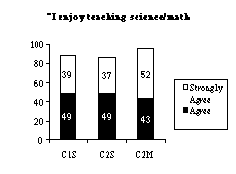 Figure 24 While responses on specific questionnaire items about attitudes and beliefs are generally quite similar across cohorts and disciplines, there are some contrasts of interest. As can be seen in Table 8, mathematics teachers are somewhat less inclined than science teachers to believe that cooperative learning groups and engaging students in inquiry-oriented activities are very important. At the same time, mathematics teachers are more likely than science teachers to rate as very important using prior student understanding in planning curriculum and instruction and developing student conceptual understanding.
Table 8
Teachers Indicating Each Strategy is
"Very Important" for Effective Instruction
|
Percent of Teachers |
|
Cohort 1 Science |
Cohort 2 Science |
Cohort 2 Mathematics |
| Have students participate in hands-on activities | 86 | 87 | 80 |
| Provide concrete experience before abstract concepts | 82 | 80 | 84 |
| Develop students' conceptual understanding of science/mathematics | 75 | 71 | 84 |
| Take students' prior understanding into account | 72 | 71 | 82 |
| Engage students in inquiry-oriented activities | 71 | 71 | 62 |
| Make connections with other disciplines | 70 | 68 | 66 |
| Have students work in cooperative learning groups | 55 | 60 | 46 |
| Use computers | 39 | 44 | 54 |
|
|
It is interesting to note that while nearly all LSC teachers indicate that using cooperative learning groups is at least somewhat important in the elementary science/mathematics classroom, not all see the importance of mixing students of varying abilities. Roughly one in five teachers indicated support for homogeneous grouping in science, and about one in two in mathematics. (See Figure 25.) As one evaluator noted, science teachers seem more open to mixing students of varying abilities:
"Students learn science/mathematics best with students of similar abilities"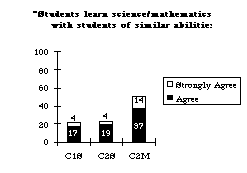 Figure 25 "Most teachers of science support heterogeneous grouping which suggests science instruction is more inclusive and able to address a range of student abilities within the same instructional setting."
LSC Project Evaluator, Cohort 2 LSC teachers are not universally sold on the importance of using student portfolios, informal questioning, and performance-based approaches to assessing student understanding. For example, while about 90 percent of LSC teachers view portfolio assessment as at least somewhat important, only about one-quarter judge it very important. (See Figure 26.) Similarly, nearly all LSC teachers report that informal questioning is an at least somewhat important method of assessing student understanding, but only about half of the teachers feel it is essential.
Importance of Various Alternative Assessment Techniques Percentage of Teachers Responding "Very Important"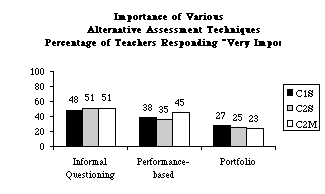 Figure 26 The high scores on Composite 2 and the generally positive attitudes toward science and mathematics education reforms exhibited by teachers throughout LSC leave relatively little room for showing the impact of LSC professional development. As one LSC evaluator noted:
"There is almost overwhelming agreement about the 'importance' of the kind of teaching strategies which the LSC projects emphasize. 'Quick and dirty' conclusion: for this group, the beliefs are in place. These teachers have at least heard what they are 'supposed to' believe, and they can fill in the right answers."
LSC Project Evaluator, Cohort 2Teacher Perceptions of Their Preparedness
When interpreting teacher responses about their preparedness to teach standards-based science/ mathematics, it is important to keep in mind that their perception of what "prepared" means is apt to change as teachers participate in LSC professional development. Prior to LSC treatment, teachers may tend to "overrate" themselves, as described by these evaluators:
"Teachers believe they are more prepared than they actually are. When they come to the professional development institute, teachers know the vocabulary and the 'politically correct' attitudes of modern science education, but they only have superficial understanding and little ability to apply knowledge."
LSC Project Evaluator, Cohort 2
"A teacher who currently teaches science with a textbook and has sufficient materials to support the activities in the book may report that she is every well prepared to teach physical science'; she is indistinguishable from the teacher who is about to embark on the journey of teaching inquiry-centered materials-based science."
LSC Project Evaluator, Cohort 2
As the following evaluator points out, teachers might likely rate their preparedness lower as they begin to understand the complexities of truly effective standards-based instruction:
"To understand the responses to the question of preparedness, we need to know what the teachers mean by prepared, and 'to teach.' It is not irrelevant in this context to point out that when teachers in [this district] were asked to rate their teaching some time ago, the teachers with the most training who were the most effective classroom teachers rated themselves the lowest. Interpreting the question of preparedness is partially a question of understanding and perception."
LSC Project Evaluator, Cohort 1
With this caveat, self-report data on teacher preparedness yield interesting insights into where teachers think they are and where they currently perceive a need for additional training and support.
The LSC Teacher Questionnaire asked teachers to rate their level of preparation in a number of areas. Regarding their general preparedness to teach science, about one-quarter of science teachers indicate they feel very well prepared, and slightly over 70 percent at least fairly well prepared. (See Figure 27.) Larger percentages of teachers are confident of their preparedness to teach mathematics, with 57 percent of mathematics teachers characterizing themselves as highly prepared and 94 percent at least fairly well prepared.
Level of Preparedness to Teach Science/Mathematics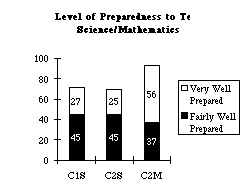 Figure 27 "I am Well-Informed About National Standards in Science/Mathematics"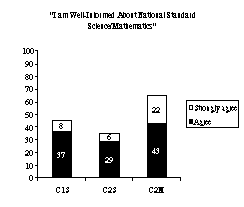 Figure 28 Interestingly, many teachers do not consider themselves well-informed about national standards. This is especially true of science teachers, perhaps reflecting the relative newness of the NRC National Science Education Standards. As can be seen in Figure 28, only 35 percent of Cohort 2 science teachers and 45 percent of the Cohort 1 science teachers report that they are well informed about the standards. In contrast to science teachers, most mathematics teachers report being well-informed about the NCTM Standards. Even prior to participating in LSC professional development, 65 percent of Cohort 2 mathematics teachers indicate they are familiar with the NCTM Standards for the grades they teach.
Several composites were created to examine in detail LSC teachers' perceptions of their preparedness to teach science/mathematics. Each composite focuses on a different area of teacher preparation: knowledge of science/mathematics topics, pedagogical content, instructional strategies, and equity and diversity.
Content Preparation
A composite of items was created to examine teachers' perceptions of their knowledge of various science/mathematics content areas. This composite includes teacher ratings of their preparation to teach the following content:
- Science: human body, ecology, rocks and soil, astronomy, processes of change over time (e.g., evolution), mixtures and solutions, electricity, sound, forces and motion, machines, engineering and design principles (e.g., structures, models).
- Mathematics: numeration and number theory, measurement, geometry and spatial sense, patterns and relationships, and data analysis and probability.
In science, ratings on this composite are lower and show somewhat greater variation than most other composites; project means range from 52 to 65 percent of total possible points. These ratings demonstrate that science content preparation is an area where many elementary teachers perceive themselves as lacking and LSC project activities could have a good deal of impact. The means for mathematics are higher, and show less variation, ranging from 73 to 80 percent. (See Figure 29.)
Table 9 provides results for individual topic areas. In general, these teachers feel more prepared to teach life science topics than earth or physical science topics. While only a handful of LSC teachers report being inadequately prepared to teach ecology or about the human body, one-third feel unprepared to teach electricity. About half of the elementary science teachers targeted by LSC projects indicate they are not adequately prepared to teach engineering and design principles to their students and another third say they are only "somewhat prepared"; these findings are not unexpected given that engineering principles are not a typical focus in elementary science curricula or teacher preparation programs.
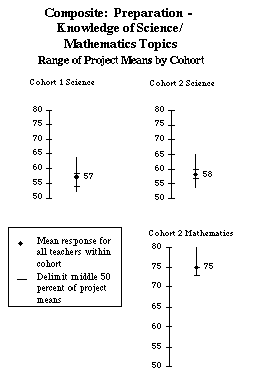 Figure 29
Table 9
Level of Preparedness Reported by
Teachers in Various Science Content Areas
|
Percent of Teachers |
|
Cohort 1 |
Cohort 2 |
|
Not Ad-
equately Prepared |
Some-
what Prepared |
Fairly Well Prepared |
Very Well Prepared |
Not Ad-
equately Prepared |
Some-
what Prepared |
Fairly Well Prepared |
Very Well Prepared |
| Ecology |
5 |
27 |
43 |
24 |
8 |
27 |
40 |
25 |
| The human body |
6 |
23 |
43 |
28 |
7 |
23 |
42 |
28 |
| Rocks and soils |
17 |
33 |
34 |
16 |
15 |
36 |
33 |
16 |
| Sound |
21 |
34 |
31 |
15 |
19 |
36 |
30 |
15 |
| Astronomy |
27 |
36 |
26 |
11 |
22 |
34 |
29 |
14 |
| Forces and motion |
27 |
38 |
27 |
8 |
24 |
37 |
27 |
11 |
| Mixtures and solutions |
28 |
36 |
25 |
12 |
25 |
35 |
28 |
12 |
| Machines |
29 |
38 |
25 |
8 |
27 |
34 |
27 |
12 |
| Processes of change over time |
31 |
34 |
24 |
10 |
28 |
36 |
26 |
10 |
| Electricity |
33 |
34 |
22 |
11 |
29 |
35 |
24 |
12 |
| Engineering and design principles |
49 |
33 |
13 |
4 |
51 |
29 |
15 |
5 |
Baseline data for C2M teachers reveal that they perceive themselves as generally well prepared to teach most of the mathematics topics included in the survey. (See Table 10.) For example, 72 percent of these elementary teachers feel very well prepared to teach computation, and more than 50 percent consider themselves very well prepared to teach patterns and relationships; numeration and number theory; measurement; and estimation. Far fewer teachers report feeling very well prepared to teach such topics as data analysis and probability or pre-algebra/algebra at the elementary level.
Footnotes
1 Four Cohort 2 projects target both science and mathematics. For analysis, teachers from these projects who completed the science questionnaire are included in C2S; teachers who completed the mathematics questionnaire are included in C2M.
2 Note that all teachers in both Cohorts 1 and 2 are elementary teachers, and are typically responsible for teaching multiple subjects. For the purposes of this report, teachers who completed the science version of the LSC Teacher Questionnaire are referred to as "science teachers" and those who completed the mathematics version are referred to as "mathematics teachers."
3 The questionnaire items included in this composite differ somewhat for science and mathematics, so it is not possible to compare science and mathematics results.
|

